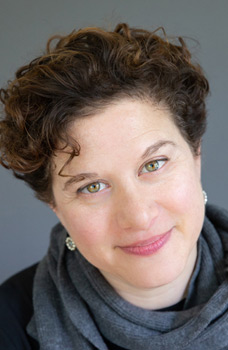
How to pronounce Jennifer Rosner: RAHZ-nur
Jennifer Rosner discusses The Yellow Bird Sings and the hidden children of the Holocaust.
The Yellow Bird Sings builds on similar themes as If a Tree Falls, your memoir about raising your two daughters who are deaf, and your family's history of deafness. How much of your personal experience influenced this story?
The works are connected in many ways. Both are about longing for connection amid silence. During a book talk for If a Tree Falls, I met a hidden child. [According to the ADL, hidden children are the youngest survivors of the Holocaust, who eluded the Nazis by hiding in convents, orphanages and other places.] A woman was in the audience, and we connected. I was talking about the deafness in my family, how I wanted so desperately for my daughters to talk and for me to hear them, and how, in my ancestry, I'd discovered deaf great-aunts who tied strings to their wrists at night--an innovation--so that they'd know if their babies cried. I was focused so much on the mother-daughter relationship, on hearing and silence in our lives, yet here was a woman who hid with her mother amid a very different, brutal and dangerous kind of silence. It was powerful and resonant, and led me into the terrain of my novel.
As part of your writing process, you interviewed many other hidden children.
I did. The woman at my book talk introduced me to other hidden children and then, from there, it kind of opened up a whole world for me. My mother-in-law knew a hidden child; also a deaf friend of mine knew one. I hadn't ever heard the term "hidden child." Their stories were just astonishing, details one could never imagine. The emotional trauma and longevity of the impact of this really struck me. These people are 75, 80 years old, and even though they have built a life, there's a part of them that is still completely devastated. Many still feel acute pain, even rejection. One man I interviewed was placed in a neighbor's care as a young boy. He told me, "If you said my mother was standing in the other room right now, I wouldn't go in there." Some still feel identity confusion, as they've lost their names, their religion, their family.
Even though this novel is set during World War II, I couldn't help but note its relevancy for our current times, especially here in America, where children are being separated from their families. Was that something that went through your mind, too?
Yes, definitely. I was thinking about the separation of children from families at the border, deportations and other current events. From my interviews, I know how much damage happens (and is currently happening), the trauma and loss, the brokenness that never heals.
Music plays a big part in Róza's and Shira's life. What role has music played in your life and that of your family?
My father played the violin every day throughout my childhood and I studied voice quite seriously when I was younger. I'd felt unheard by my mother, and singing was a way I could actually "reach" her. She loved to listen to me sing. I grew up knowing the transporting power of music, as well as its connecting power.
If The Yellow Bird Sings had an accompanying playlist, what would be on it?
All of the music Shira plays, especially Brahms Scherzo from the F.A.E. Sonata, and also my favorite piece, Bach's Concerto for Two Violins.
While they are in hiding, Róza invents a comforting story for Shira about a yellow bird that sings the songs she can't, because of the need to remain silent. What do you think this says about the power of stories over time?
Wishes, fears, all kinds of feelings that we can't admit aloud, can find voice in our stories. I think this is one reason stories are so powerful. The story in my novel gives Róza a way to bond with Shira, to entertain her, to distract her, to pass the time. As a writer, I made use of the imagined story to deepen the novel's subtexts. For example, Shira wants to be like the outside children (to go to school, be normal), so in the story, Shira's bird tries to make himself more like the outside birds. And so on. We always told a lot of stories to our children.
The research for The Yellow Bird Sings took you to Poland and Israel. What was that process like?
My trip to Poland allowed me to immerse myself in the sensory aspects of my settings--to see, smell, hear and otherwise explore a convent where Jewish children were actually hidden, a span of woods where soldiers camped, a barn--and it was amazing to compare these to what I'd dreamed up at my desk. It was weirdly close because of all the reading I'd done. One of the most remarkable sites was in Israel, seeing Amnon Weinstein's luthier shop and his collection of war-salvaged violins, Violins of Hope.
What do you hope readers will most take away from your novel?
My novel is, at heart, about connectivity, about beauty and hope in the face of irrevocable loss. It's also about the costs of war, especially to children.
What can readers look forward to next from you?
A new novel, set somewhere warmer--not Poland in winter!
Unless otherwise stated, this interview was conducted at the time the book was first published, and is reproduced with permission of the publisher. This interview may not be reproduced or reprinted without permission in writing from the copyright holder.
Your guide toexceptional books
BookBrowse seeks out and recommends the best in contemporary fiction and nonfiction—books that not only engage and entertain but also deepen our understanding of ourselves and the world around us.